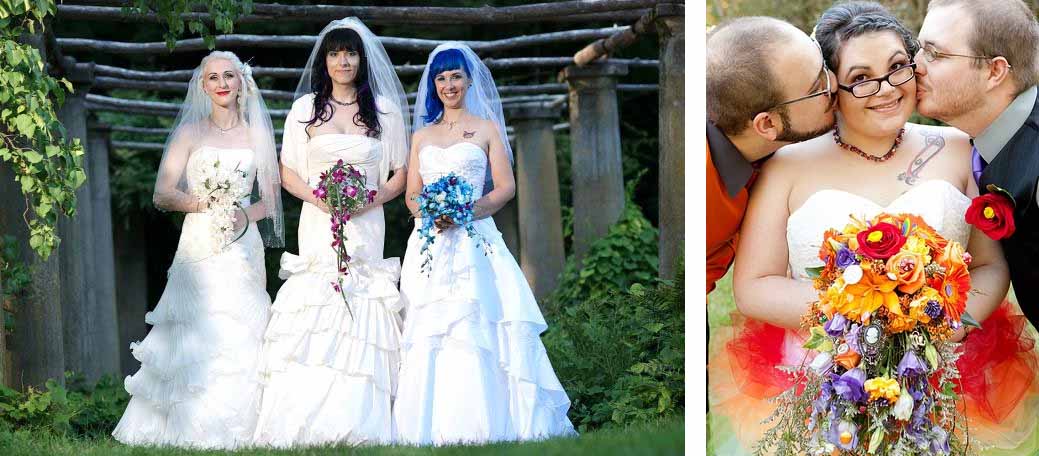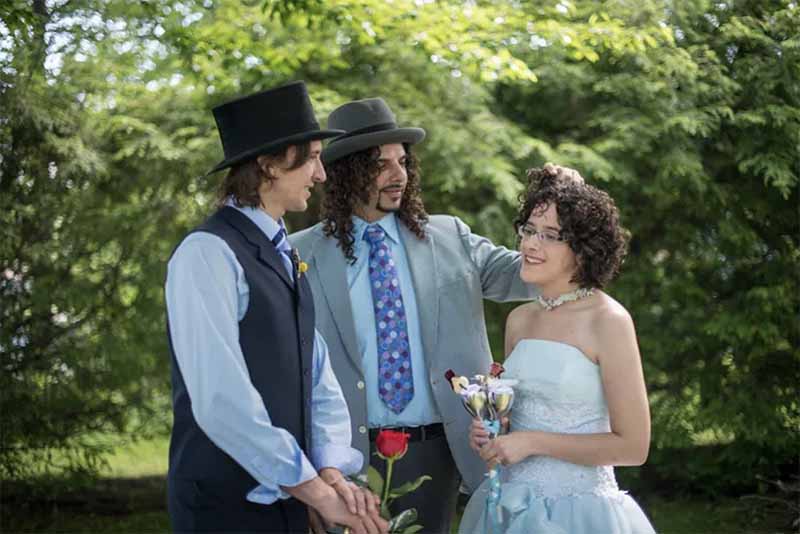Polyamorous relationships have always been a part of human culture for many people all over the world. Traditionally wedding ceremonies acknowledged the love and union between two people which excluded polyamorous relationships. Polyamorous weddings and commitment ceremonies exist, and each one is as unique as those within the relationship.
What is polyamory?
Made up from the Greek word ‘poly’ meaning many or several, and the Latin word ‘amor’ meaning love, polyamory is the desire for intimacy with more than one person. Polyamory is being in a relationship with and loving more than one person. As with all relationships, poly relationships are unique to those involved, but all involved in the relationship are aware of the situation. There may be a throuple (three people), or a quad (four people).
Polyamory isn’t cheating on one partner for another
Certain religions recognise polyamory as part of their customs and beliefs. While legally within the UK only two people can be recognised as being within a marriage, poly people can celebrate their union with a wedding or ceremony. Celebrant ceremonies enable people with many lifestyle choices to have a meaningful and bespoke wedding or ceremony in celebration of their relationship and union. As a genuine alternative celebrant who creates and crafts many kinds of ceremonies for many kinds of people, each ceremony enables all people in relationships the opportunity to have a wedding or a commitment ceremony which is right for them.
A wedding is a ceremony where those involved make a commitment to each other. Some weddings are huge lavish events with hundreds of guests and family members, some are very intimate with just the couple present. Polyamorous weddings and commitment ceremonies are the same.

Your Polyamorous wedding
Your polyamorous wedding or commitment ceremony should be personalised to your relationships. If you are looking for a celebrant to create and perform your ceremony, you want a celebrant who understands your ceremony requirements. Expecting poly people to fit into a scripted template used for two people isn’t correct and you should ask any prospective celebrant what ideas they have to make your poly wedding or commitment ceremony unique.
As an alternative Celebrant I have had the honour of writing and leading numerous weddings and ceremonies for poly clients. Some involve just two people with the third person choosing to take a back seat from the ceremony. Some have involved two people with the first partner acting as a maid of honour or best man who plays an active part in the ceremony. Others have been for throuples or a quad.
Personalised vows said to each other should reflect the love and commitment to those involved, with each person saying vows they have chosen to be said. You might decide to exchange wedding rings, commitment rings or other pieces of jewellery as a gift to each other, symbolising the commitment of each person involved in the relationship.
Weddings and ceremonies can include handfasting involving hands bound together with chosen cords or ribbons. You can involve other people within this. If you are having a wedding ceremony between two partners, a third or further partner could be the ideal person to make this binding special. Unity ceremonies or rituals including oathing or blending ceremonies, the lighting of a unity candle from three or more separate flames are meaningful, visual and memorable ways to mark for commitment.
Asking friends or family to read chosen poems, or to be ceremony witnesses as your sign a commemorative ceremony certificate are two other ways of many to involve chosen people within your ceremony.
Planning Your PolyAmorous Wedding
Once you have a venue and your celebrant, you may want to book other suppliers such as a photographer and videographer to capture and visually document your day.
Your wedding cake can be made up of the same number of tiers as there are partners involved, each choosing a different colour and flavour of cake to add more personal touches to your ceremony day.
If there are to be wedding dresses, will each person choose a different style, length and colour dress? Will there be bouquets or alternatives to flowers? Will you have any pets there? Will there be more than one Best Person? Will you all enter together? Will there be other roles for family and friends to take on? This is a time and a day of celebration and all partners need to make sure their choices and personalities are reflected within the ceremony and the day.
A polyamorous wedding day is a day celebrating the personalised relationship of those the day is about. Every relationship is unique; therefore, every celebratory ceremony should be too.





